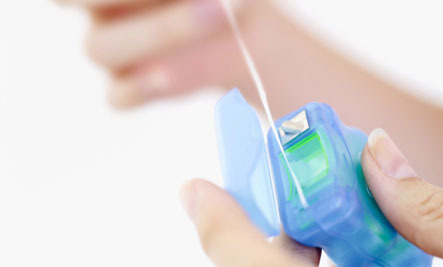It happens every six months, almost without fail. You come in for your cleaning appointment, we ask about your hygiene routine and specifically about your flossing habits. You lie and say you do it every day, without fail. And that’s too bad, because once you admit flossing is a stumbling block, there are tips and tricks we can offer to help you get in the habit.
Let’s talk a little more about why flossing is so important, and how we can get back to having a more honest relationship with dental floss.
Flossing Matters

Flossing Keeps Teeth Intact
Once periodontitis sets in, gums can pull away from the teeth, leaving large gaps where even more harmful bacteria can form. These pockets can become infected, triggering your body’s immune response, which leads to inflammation. This inflammation can damage the bones and connective tissues that hold the teeth in place, and when that gets damaged beyond repair, the tooth can fall out.
That’s right, skipping the flossing step in your dental routine can lead to lost teeth, and not the cutesy kind little kids look forward to when expecting the Tooth Fairy. If you would prefer to hang on to your natural teeth, it’s in your best interest to tell us at your next appointment that you’re fighting the floss so we can work together on some alternatives.
Flossing Alternatives
There are some legitimate reasons why people avoid flossing, and we can help. For example, people with a very sensitive gag reflex may find reaching back with traditional dental floss can trigger that reflex. It may be as simple as switching to something else, like a Proxabrush, which can clean between the teeth without using traditional floss.
There are alternatives to flossing that can work just as well, and we can help you find one that will be right for you. So the next time you’re in for a cleaning and we ask about your flossing habits, be honest!


